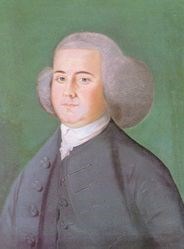“Except these boats all in a hurry”
Early on in that 24 Sept 1775 missive, Dr. Church wrote:
The distroying the Ships in the manner I wrote you before they began to dispair of tho’ the former of the Machine is full of faith that he can do it, Works on hardly and so let him, I say.This is probably the same “mashine” that engineer Jeduthan Baldwin wrote about in December:
went in the afternoon to Dotchester point to See the mashine to blow up Shiping, but as it was not finished, it was not put into the water.Church’s letter suggests that the man forming that machine was at work months earlier, in September.
But what was the machine? David Bushnell’s submarine is one possibility. We know he was at work on that invention by August 1775, and that in October people in the American camp were hoping to see it soon. But the dates don’t quite match up; Bushnell was still toiling in the Connecticut River on 7 December, so what did Baldwin see kept out of the water one week later? The machine at Dorchester Point might never have been finished while Bushnell’s Turtle actually went into battle in September 1776.
Church alerted his Crown contacts to other water-borne threats:
This day a floating battery hid herself under Mr Tempels Wharf, from Mistick bridge.“Mr. Tempels Wharf” meant the wharf on the Mystic River that led to Robert Temple’s farm in Medford, shown above in a detail from Henry Pelham’s map of the siege.
One hundred 50 flat bottom boats are ordered to be Compleated within 30 days they are building them as fast as they can at Water town and Cambrige I see them every day, this you may depend on. And I am not a little Surprised to find them so Engaged in making these boats, for I know the people in general think it impossible ever to go into Boston, you in it. ————. . . .
Our Assembly has been sitting 3 days they have been debating by what means they can keep the Coast Clear of tenders, but have not yet Concluded.
No News from the Congress some days things look as if our General intended to do something soon, than again I am strongly persuaded that nothing will be done, in fact war you out you could not satisfy yourself there is nothing that looks like matters Except these boats all in a hurry.
In October, a couple of weeks after Dr. Church wrote, the Continental troops did try to attack the British in Boston with floating batteries. It didn’t go well, as these posts describe.
Gen. George Washington was indeed eager for an amphibious assault on Boston, but his council of war kept voting down his plans. Even the move onto Dorchester Heights included a contingency attack across the Charles River if the British tried to counterattack. But in the end all those flat-bottomed boats were never used in battle.
TOMORRROW: The flag-raising.



